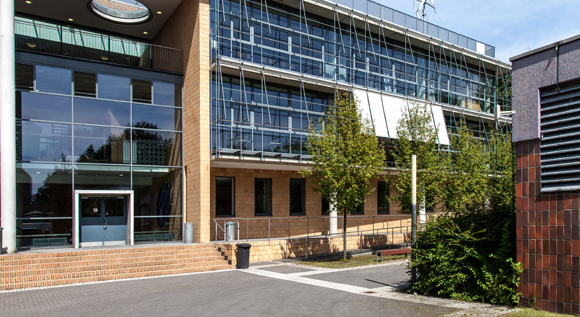From 1 July 2015: more support for local authorities and businesses
Whether in schools, production plants or office complexes – too much energy is being consumed in some 1.7 million non-residential buildings in Germany. From 1 July 2015, the KfW banking group, acting on behalf of the BMWi, will provide more support for the energy-efficient construction and retrofitting of non-residential buildings.
 © BMWi/ Holger Vonderlind
© BMWi/ Holger Vonderlind
"We want to achieve a virtually climate-neutral building stock by the year 2050. To do this we need to make further progress in energy efficiency in the building sector, and not only in residential buildings, but also in commercial buildings and municipal facilities. That is why we have introduced this new KfW funding scheme to assist businesses and local authorities in investing in energy-saving building improvements, and with it we are closing a gap," says Sigmar Gabriel, Federal Minister for Economic Affairs and Energy. The funding is provided as part of the Government's CO2 Building Renovation Programme.
Businesses and local authorities will in future benefit from low interest rates and repayment subsidies of up to 17.5 percent if they refurbish their buildings to KfW building energy efficiency standards or carry out dedicated renovations to the building envelope or upgrade the technical installations. The primary objective is to improve energy efficiency.
Strong incentives for investing in building construction, too
The KfW, a publicly-owned development bank, and the BMWi are together setting very attractive incentives also for investing in new buildings with low energy needs. "There are significant efficiency potentials lying dormant in non-residential buildings that can bring businesses and local authorities not only major CO2 reductions but also real cost savings. Over 40 per cent of the primary energy demand of all buildings comes from non-residential buildings," says Dr. Ingrid Hengster, a member of the KfW banking group's Executive Board. "We are pleased to be able to offer in future not just our highly successful financial assistance for residential buildings but also funding for energy-efficient construction and renovation of non-residential buildings for all kinds of businesses."
From the beginning of July 2015, business enterprises irrespective of size will be able to apply for the promotional loans via their regular banks. From 1 October 2015, local authorities, social welfare entities and municipal corporations will also be able to obtain assisted funding for energy-efficient construction projects via the KfW. From that time, the assistance already provided for the energy-efficient rehabilitation of the municipal and social infrastructure will be substantially improved yet again, for example by the introduction of repayment subsidies of 5.0 percent for certain energy-saving upgrades.
The CO2 Building Renovation Programme
The CO2 Building Renovation Programme is already an important component of the Energy Transition. About one third of all building renovations receive financial assistance through this programme. Every second new home is already built with KfW funding and is thus constructed to better standards than are prescribed by law.

